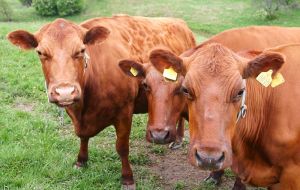MercoPress. South Atlantic News Agency
Sweden sponsoring tax on meat consumption to help reduce greenhouse gases
 Last year Swedes consumed 87 kilos of meat, mostly beef and veal
Last year Swedes consumed 87 kilos of meat, mostly beef and veal In order to reduce greenhouse gases and to sustain the environment Swedish agricultural authorities are suggesting a tax to tame the appetite for meat. The more meat is consumed the more feed is needed to meet this demand, and with the extensive drought the occurred in the US and feed shortages elsewhere in the world. Could this be a viable solution?
Last year the average Swede consumed 87 kilos of meat with beef and veal being the most consumed.
Marit Paulsen a Swedish MEP who is vice president of the European Parliament’s agriculture committee said she would prefer the Swedish meat consumption to shrink to 45-50 kilos per person per year which was the level 20 years ago.
Nutrient run-off and pesticide use in agriculture is influenced by the amount of meat we consume from which animals the meat comes and what feed they eat. Reduced nutrient run-off and reduced pesticide use can also be achieved by improving production methods at the farm level.
Consumers can contribute to sustainable food production by avoiding the meat that is worst from a sustainability perspective. Labelling is one way to make it easier for consumers to choose meat that is more sustainable.
There are also positive environmental impacts from meat production. Grazing animals are required in order to preserve Swedish semi-natural pastures. These pastures are important for biodiversity and rural landscapes.
However, particularly for beef there is a conflict of interest between preserving pastures and jobs and reducing greenhouse gas emissions. (Meat Trade News).-




Top Comments
Disclaimer & comment rules-

-

-

Read all commentsDoes Marit Paulsen also campaign against bio-fuels? Forest clearance in the name of saving the planet.
Feb 28th, 2013 - 10:04 am 0“Labelling is one way to make it easier for consumers to choose meat that is more sustainable.”
This surely is a joke, in the wake of the false labelling surrounding the horse meat fraud.
Indeed, with the IKEA issues of horse-meat meat-balls, good timing for this story! Of course, horse-meat is healthier than beef... However, the issue or raising beef prices through taxation has been a popular method of swelling the government coffers through these “sin taxes”, without there necessarily being a direct financial benefit accruing to actually trying to reduce the consumption of the sin-product (beef, cigs, booze, gambling, etc). In resource policy, it might be called “demand side management”, using higher pricing to induce lower consumption (usually resources like energy, water, transportation, etc). The rich don't care - they probably already pay much higher prices to get premium quality products anyway. This food DSM would more directly hit at low-income folks. Thats the way of the world of economic and political power.
Feb 28th, 2013 - 01:25 pm 0John,
Feb 28th, 2013 - 03:52 pm 0I ssem to remember an old comic song: “Horse meat balls are very indigestible, especially when eaten with scrambled egg”
Though I dont eat horse meat myself as you say it is probably healthier than beef. The Belgians seem to eat quite a lot of it ,if that means anything. Added to which horses are not ruminants and therefore do not belch or fart greenhouse gases into the atmosphere, something that the greenies accuse us farmers of doing
So far here in Uruguay no fertilizer run offs into the rivers has been detected mainly because almost all of our beef is grass fed and so more tasty
Fertilizer is espensive and its bad business for the arable farmers here to overuse it so that it pollutes the watercourses.
Added to which with the massive afforestation here we absorb more CO2 than we produce and should therefore receive carbon credits
Perhaps our Nordic friends should take a leaf out of our book. Maybe thier cows should be fed swedes and turnips (watch out Think!) instead of grain
Our national slogan is “Uruguay: Pais Natural” and long may it continue so. Its good farming business and practice
Commenting for this story is now closed.
If you have a Facebook account, become a fan and comment on our Facebook Page!